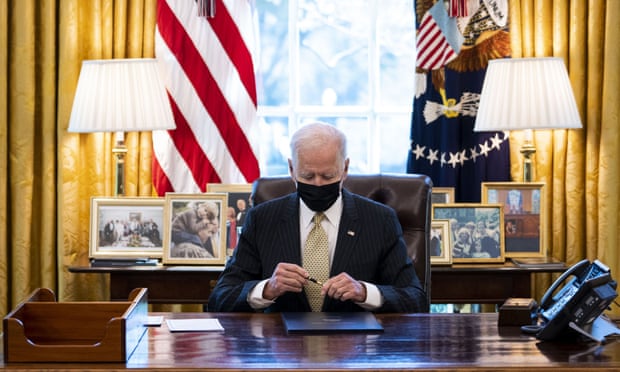Biden promises 'historic' $2tn spending in infrastructure – but Capitol Hill fight awaits
Joe Biden will unveil an
expansive $2tn proposal to rebuild the country’s infrastructure, confront
climate change and curb wealth inequality, part of a sweeping spending package
that could define the president’s economic legacy.
Biden’s
plan, which he will lay out at a speech in Pittsburgh on Wednesday afternoon,
includes “historic and galvanizing” investments in traditional infrastructure
projects such as roads, bridges and highways, as well as hundreds of billions
of dollars to fortify the electricity grid, expand high-speed broadband and
rebuild water systems to ensure access to clean drinking water, an
administration official said on Tuesday. It also seeks to expand access to
community care facilities for seniors and people with disabilities and invest
in research and development and workplace training.
He will propose paying for the new spending with a substantial
increase on corporate taxes that would offset eight years of spending over the
course of 15 years, officials said. Among the changes, Biden will call for a
rise in the corporate tax rate to 28% from 21% and measures to force
multinational corporations to pay more taxes in the US on profits earned
abroad. The tax plan would unwind major pieces of Donald Trump’s tax-cut law,
which lowered the corporate tax rate from 35% to 21%.
The package, known as the
American jobs plan, is only the first part of the president’s sprawling
infrastructure agenda. Aides say he will present a second legislative package
next month that will focus on investments in healthcare, childcare and
education. That package is expected to be paid for, at least in part, by
raising taxes on the nation’s highest earners.
As a
candidate, Biden promised not to raise individual taxes on those earning less than
$400,000.
The
scale of the proposals, together expected to cost as much as $4tn, has been
compared to Franklin Roosevelt’s New Deal or Lyndon Johnson’s Great Society. A
memo outlining its ambition states: “Like great projects of the past, the
president’s plan will unify and mobilize the country to meet the great
challenges of our time: the climate crisis and the ambitions of an autocratic
China.”
Biden’s allies on Capitol
Hill are gearing up for a fight over the infrastructure legislation that will
likely prove to be significantly more contentious than the swift passage of
Biden’s $1.9tn economic aid bill, which was enacted earlier this month with
only Democratic votes.
While the urgency
of the pandemic helped Democrats overcome a handful of objections to pass
Biden’s coronavirus relief plan, there is infighting over what belongs in the
package – and whether the administration should spend time attempting to forge
a bipartisan consensus.
Both Democrats
and Republicans share a goal of fixing the nation’s ageing roads, bridges and
other critical infrastructure. Yet they disagree sharply on the details – how
much to spend, what constitutes “infrastructure” and how to pay for the
investments. This chasm was too big for either Barack Obama or Trump to
overcome and both failed to make progress after promising to rebuild the
country’s infrastructure.

